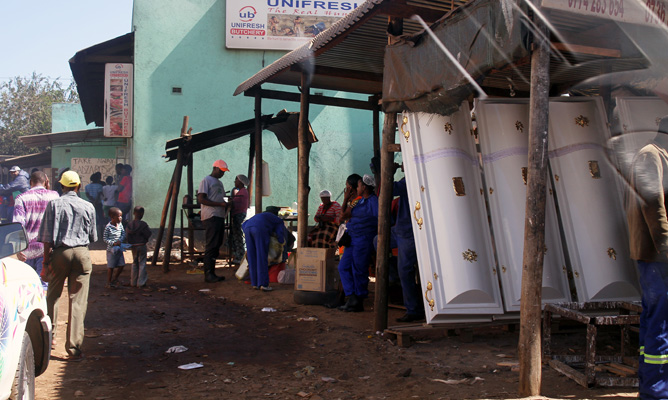
The Standard recently ran a story of street butcheries selling sausages under unhygienic conditions. The source of the sausages were unknown and their storage facilities questionable.
By Phyllis Mbanje
Last week we tracked down one sausage factory in Magaba area of Mbare. Commonly referred to as kwaKoefman, the area is no different from most parts of the sprawling suburb.
Piles and piles of rotting garbage line up the dirt road that leads to Unifresh butcheries were the sausages are produced.
The pungent smell that comes from the rubbish deposits is nauseating and for a moment we are not sure we are on the right track.
How can such filth be in the same vicinity with a huge factory that makes sausages for human consumption? Hordes of flies, especially the notorious green bombers that are never far away from rotting flesh swarm the place.
These pesky flies however do not deter the patrons of the area as they hover over the decomposing litter which includes vegetables from the nearby Mbare market.
A tired-looking vendor, who has a hacking cough that threatens to split his wiry chest, sits on a small stool by the road side selling roasted peanuts. We stop and ask him if we are on the right road and before answering he gazes curiously at us and points a gnarled finger at a some green building.
- Chamisa under fire over US$120K donation
- Mavhunga puts DeMbare into Chibuku quarterfinals
- Pension funds bet on Cabora Bassa oilfields
- Councils defy govt fire tender directive
Keep Reading
Go through that alleyway,” he says noticing our hesitation.
As our car pulls off, a woman balancing a basket full of tomatoes suddenly loses balance and the basket comes crashing down into a puddle of dirty water. Tomatoes are scattered everywhere and many, break to pieces.
Without hesitation she picks up the basket and starts picking up the tomatoes, wiping them on her faded blue denim skirt that has seen better days and looks like it has not been laundered in a while.
An alert young man (there are lots of these who are looking for potential customers who need any service) bends down and assists the woman.
The still hot air and the bad smells become worse as we approach our destination. Right by the corner is a coffin-making workshop. Three guys are absorbed in their work, chiselling away at the cheap wood. The finished white coffins look ridiculously out of place, especially since they are so close to a make-shift braai area.
Eager customers flock to the eatery and gorge themselves on meat. There is a lot of movement as we get closer to the entrance of Unifresh Butchery. We barely manage to find a parking spot as both sides are lined-up with cars.
Hordes of people jostle to get their orders and the entrance resembles a war zone. Women with babies strapped on their backs push and shove to get ahead of the long queue.
The whole area is wet and muddy and littered with bones, discarded empty juice bottles and maize cobs.
There is too much confusion and we ask one of the sales people in a butchery across from Unifresh what the procedure was and he offers to take me inside the factory.
He leads me to a grubby door and invites me inside. I stop dead in my tracks. The sight that awaits me is too appalling and I run out of breath. The medium-sized room is littered with mounds and mounds of meat. There is blood all over the grimy floor. Men in green and blue worksuits and black gumboots are busy at the machines churning out minced meat which will then be used to make the sausages.
A young man in a far corner beckons to me and I frantically look for a path that is dry, but the whole floor is scarlet red.
Customers, some of them butchery owners, hover over the processes and are not bothered by the smell or the sight.
There are no checks done here, one simply brings their meat and service is rendered.
“We don’t care if it is cat meat or what, all we want is money [20 cents per kg]. We do not separate or select choice potions, we just put it through the grinder,” said my new friend, * Liberty.
He invites me close to his workstation. There is a heap of bloody bits of meat and I cannot tell if it is meat or coagulated blood.
He shoves the bits into the machine and out comes the minced meat ready for casing and spicing.
“I have lard and spices which we sell here,” he winks at me as he grabs another chunk with his bare hands.
Just when I think I have seen enough, I catch sight of orange brownish sausages stashed in the corner.
Liberty follows my eyes and his sweaty face breaks into a grin. “Those are smoked sausages, very popular, those women at the entrance are buying them.”
So that is where the suspicious looking sausages that I saw on sale at Copacabana terminus were coming from.
Suffocating on the smell, the flies and the bloody floor, I politely take my leave promising to come back. Liberty gives me his number and I scuttle out of the room anxious to get some clean air, but once outside I’m accosted by the smell of the rotting garbage.
We drive out of there at full speed and I try to hold my breath for as long as my lungs can permit. But one thing is very clear in my mind; this is a sitting health time bomb and unsuspecting customers are buying sausages that are being prepared in such unhygienic conditions.
Who knows what kind of meat is being used, cat, dog, donkey even. Surely, where are the health inspectors when all this is happening?
* Not his real name










